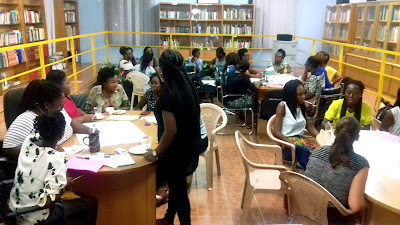A few days ago I experienced a rare and beautiful thing; a
meeting of young feminists in a safe space. In this case, that space was the African Women's Development Fund (AWDF) office
and this was the first ever Young Feminists Gathering they have hosted. It’s not
often that I meet feminists in my hometown of Lusaka or in Accra where I’m
currently staying. More common are the
misguided voices saying feminism is unAfrican or that feminists are just angry women who can't find a man.
After the ice breaking – which included introductions and
spelling each other’s names with our butts (weird, but we actually did that!) - an AWDF
staff member, Belinda, gave a talk about the organization including its history and the
work it does. Next up was a talk
about our “Feminist African Ancestors” given by Maame, another AWDF
staff member. The feminist ancestors included late Zanzibari musician
Bi Kidude and the ladies of the Igbo’s Women’s War, also known as the
Aba Women’s
Riot. I was familiar with Bi Kidude, a woman who challenged traditional gender roles in a conservative Muslim society and defied expectations. But I was totally unaware of the ladies of southern
Nigeria, who in
1929 staged a revolt against colonial taxation. This served as a
reminder that I need to learn
more about women of colour, both past and present, and their fights
against the
system designed to oppress them.
Another AWDF staffer, Jessica, spoke about the definition of feminism
or rather as she put it, “feminisms.” It was the first time I’d heard it
referred to in the plural but it immediately made sense. While there are some
basics many feminists agree on (a belief in equality of the sexes), there is no
one feminism and I continue to discover new types. From atheist feminism to
Islamic feminism and choice feminism to eco-feminism, diversity exists within
the movement.
Feeling woke
After a discussion on the meaning of feminism we moved on to discussing
certain words and concepts, relevant to women's and more broadly speaking, social justice issues. Each of us picked a piece of paper with a word or
concept that was to be discussed. Terms included meninist and ant-feminist
triggers such as patriarchy, rape culture and mansplaining. Others were
choice, sisterhood, self-care, misogyny, misandry, heterosexism, personal is political, gender non-conforming and a personal
favourite, intersectionality. Boy was I feeling woke and up to date with the
lingo, until we got to 'chosen family,' a term I’d never heard. And might I add, it was great being with
people who got it and didn’t find the language strange.
What’s wrong with anger anyway?
Addressing the stereotype of the ‘angry feminist’
some ladies questioned what the problem with anger is anyway. Anger at injustices
causes some to act and can help bring about positive change. Anger in and of
itself shouldn’t be a problem. But some of the ladies in attendance could attest to how speaking out about
social injustices and inequities we see and experience can often lead to dismissive tone policing (attacking the tone of a message rather than critiquing its content).
He’s the man!
Grabbing takeout with a male friend (who just so happens to be a feminist ally) after the YFG, I noticed
that our server turned his back to me and made a point of only showing the bill
to my friend only. I had planned to pay a least part of the bill and I asked the server why he didn’t
bother showing it to me. The response, as he looked at my friend and then
back at me: “He’s the man!” Aside from thinking this man needed to be brush up on his customer service, I thought back to the end of the YFG, when we were asked to give one
word describing how we felt. I gave two: grateful and validated. Sitting in that fast food place, I felt grateful and validated once more. Grateful to have spent the afternoon with ladies who understood the trouble with comments like the one the server made. Granted, the comment was not meant to be harmful, but my male friend and I found ourselves subject to gender stereotyping and it was less than an hour since I left the YFG and that is where the feeling of validation came in.



